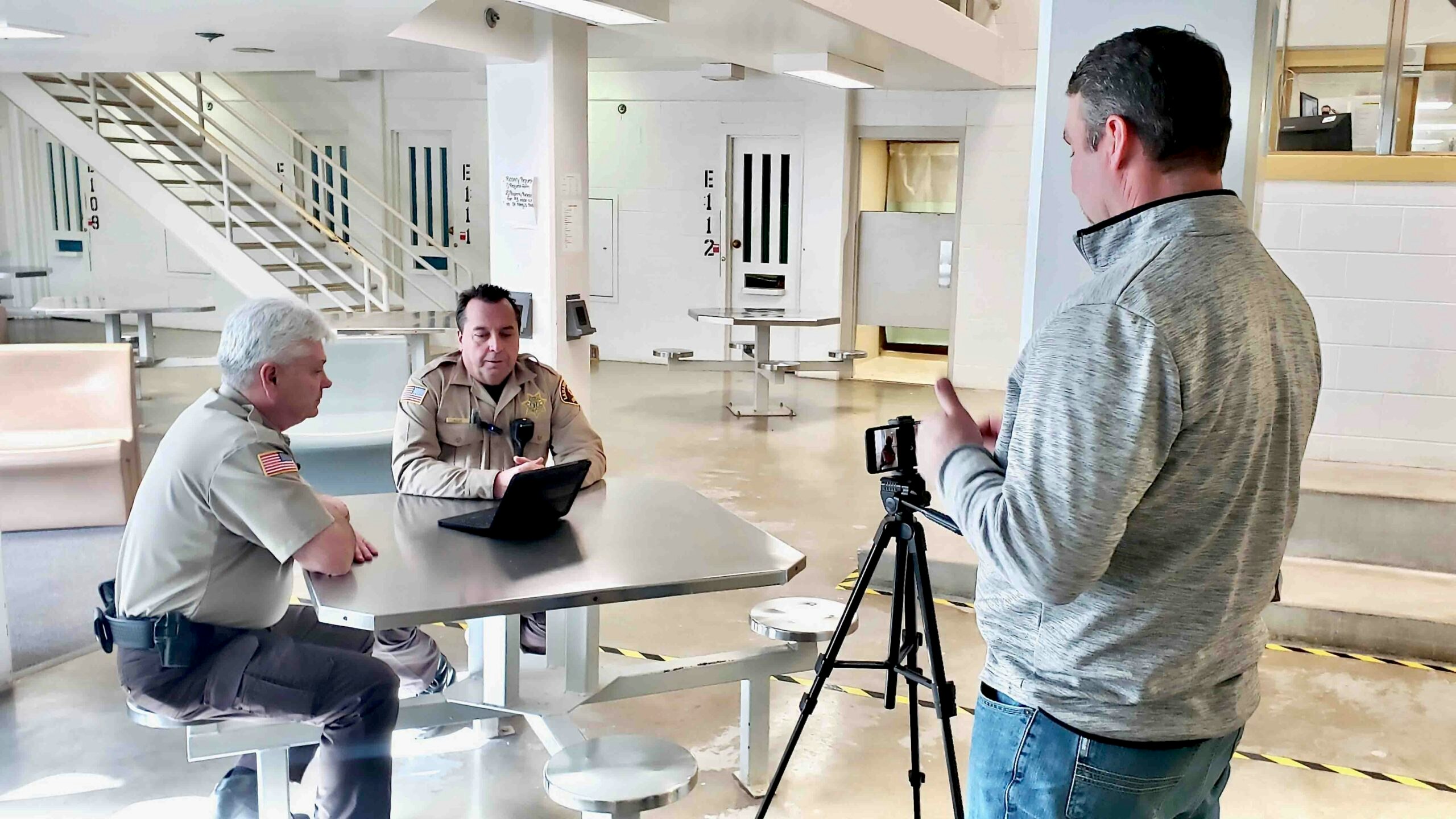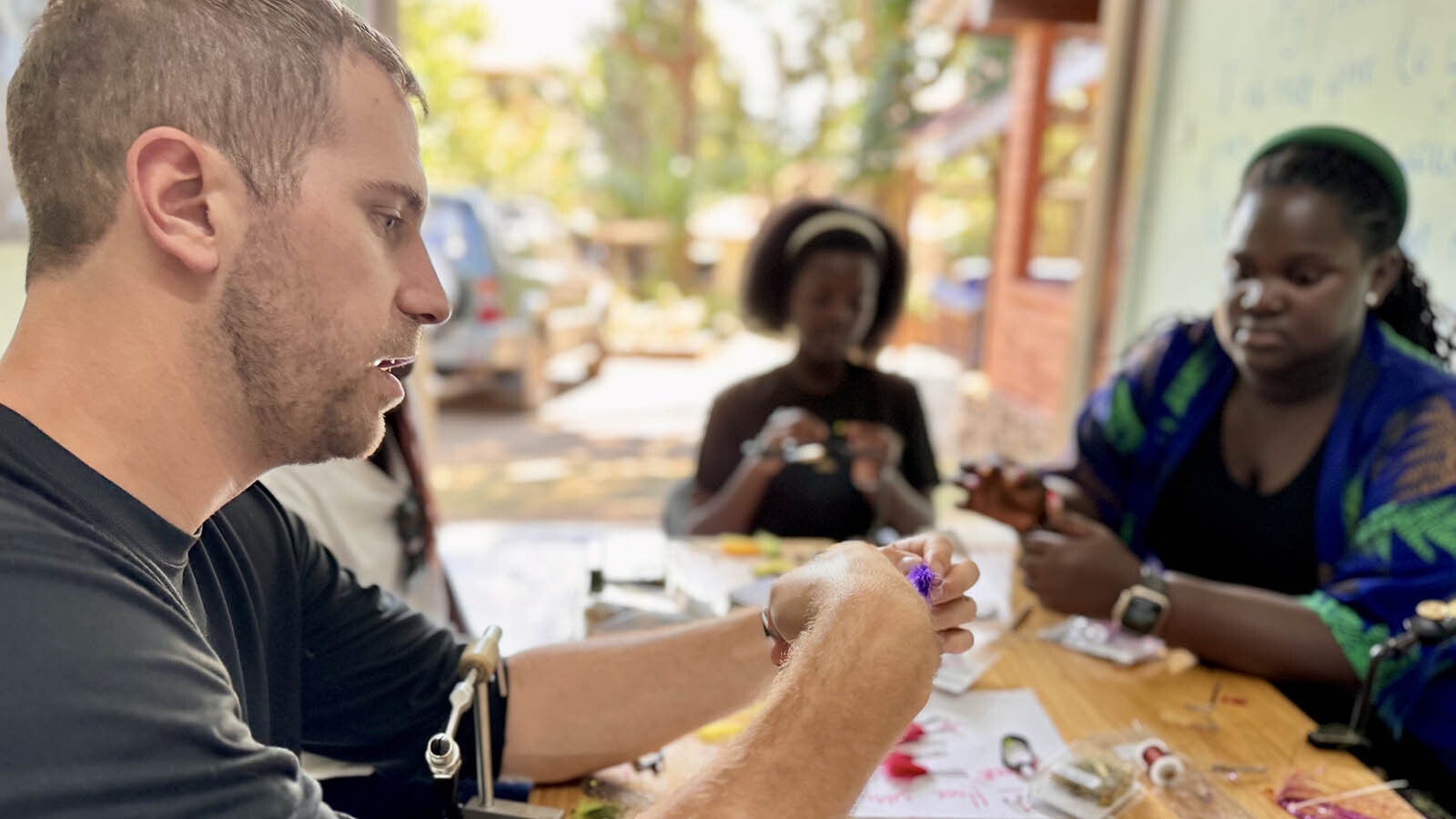To most people, a job at the jail house is neither sexy nor glamorous.
But Colleen Ornisto is not most people.
Ornisto is not just a member of the Laramie County Detention Center Staff, she’s a trained hostage negotiator, too.
At first glance, she might seem quiet and unassuming as she talks about the day her negotiating skills saved a life, just like in the movies, but she is highly trained, and effective at her job.
Her story is briefly told in a one-minute, 25-second video on the Laramie County Sheriff’s Department Facebook page. It’s part of a new podcast series Laramie County Sheriff Brian Kozak has begun to help with workforce recruitment.
Ornisto had not been expecting a call-out that day last year in January when she saved a life. In fact, she wasn’t even wearing the right kind of shoes for climbing up a ladder. The shoes were prone to falling off, and worse yet, slippery on the bottom.
She climbed the ladder anyway, knowing her presence would be vital to making a personal connection.
Once she made it to the top of the roof, she recognized the man. His first name was Gentry, and he’d been in the Laramie County Detention Center on a misdemeanor charge some time ago.
“I had built a rapport from working with him in (the jail),” Ornisto said.
Breaking Through
Ornisto is the kind of detention officer who talks to everyone, but she has a particular knack for talking with those who are clearly struggling.
When she first met Gentry, she knew the homeless man just needed someone to listen. If, that is, she could just get him to open up and actually talk to her.
“I was determined,” Ornisto recalled. “I was going to have a conversation with him.”
It took time, but eventually Gentry came to see that Ornisto was sincere. She really did care, and really was willing to listen to him.
“People make mistakes, you know?” Ornisto said. “And they are also so embarrassed to be here.”
With time and patience, Ornisto no longer had to work quite so hard to talk to Gentry.
“He’d knock on the window and tell me, ‘Hi,’” Ornisto said. “And I’d ask him how he was doing, and he’d say, ‘Thank you for caring.’”
Split Second Decisions
That day on the rooftop, Ornisto had a split second to think of what to say to change the situation. Training helped steady her nerves. But knowing Gentry also helped a great deal.
“A lot of times, people just want somebody to listen to whatever they’re upset about,” Ornisto said. “So that’s what it was with him.”
Gentry, it turned out, was terrified that if he continued to be homeless and kept hanging out with the same people he did, he would just end up back in jail.
“He didn’t want to live that life, so he thought his only option was to end his life,” Ornisto said. “But I told him if he came down, then I would get him to help.”
Because she knew him, Ornisto was able to quickly shift the conversation away from Gentry’s fears to his concern for others, which ultimately helped defuse the situation.
“He trusted me, and it took a lot of people,” Ornisto said. “But his worry that day when he saw me climb up to that area, which was very high off the ground, was that he didn’t want me to get hurt.”
Ornisto told him she wasn’t leaving until he came down the ladder with her.
“He didn’t like that,” Ornisto said. “So, he chose to let the fire department help him down.”

Fighting Burnout
Ornisto’s story is just one in a series Laramie County’s new Sheriff Brian Kozak plans to share about those who work at the jail. He’s hoping the podcasts will not only increase the transparency of the operation, but help him with recruitment.
“A lot of people may not know that even though you’re working in the jail, you can still do all of the other activities that a sheriff’s deputy can do, and one of them is, you know, you can work on the SWAT team,” he said.
There were more than 40 positions open at the jail when Kozak came onboard after the election. That’s been causing a strain on the remaining employees for some time now. It’s a situation that can rapidly become a downward spiral leading to more people leaving. The dynamic is something he wants to reverse as quickly as he can.
“Right now, the employees are on mandatory overtime shifts, and what’s happening is they’re suffering from some, you know, they’re being overworked. It’s burnout. They’re not getting time with the families that we really want them to have.”
Kozak hopes by showing that detention careers are both more varied than most realize and can offer chances to save lives and make a difference in the world, that more young people will be interested in choosing that as a career.
Other Steps
Kozak is not, however, relying solely on efforts to glam up the image of corrections officers.
“The salary has been increased, so the starting salary you’re looking at is about $60,000 to be a detention deputy,” Kozak said. “And we also lowered the age requirement to 18. So someone coming in right out of high school, we can train them, and get them on board as a detention deputy if they, you know, they have to meet the standards the background investigations, the polygraph, psychological testing, and all that.”
The average starting salary for entry level positions in Wyoming is $30,517, according to ZipRecruiter.com.
Officers who are 18 to 20 years old can work at the adult jail. Kozak is allowing only those 21 and older at the juvenile detention center.
The new Laramie County Sheriff has also implemented a new program he calls Hire the Retired.
“It used to be that if you retired as a law enforcement officer in Wyoming, you could not get another job in law enforcement,” Kozak said. “If you did, your retirement benefits would stop.”
That is sending a lot of retired law enforcement personnel out-of-state, where they can work a second policing job and still keep their pensions.
“So we’ve fixed that so you can keep your pension and still work in Wyoming,” Kozak said.
Any county in the state could set up a similar program, Kozak suggested, by having their county commissioners pick up the tab on what such employees would normally pay into the retirement system.
“The county pays that to keep the system whole, and that way the employee doesn’t have to, and the benefits don’t stop,” Kozak said.





